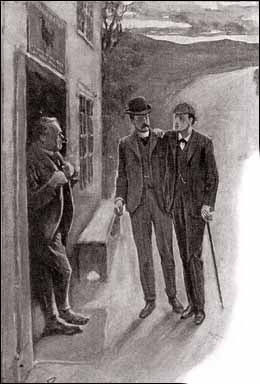| The Priory School 7 | The Priory School 8 |
As we approached the forbidding and squalid inn, with the sign of a game-cock above the door, Holmes gave a sudden groan, and clutched me by the shoulder to save himself from falling. He had had one of those violent strains of the ankle which leave a man helpless. With difficulty he limped up to the door, where a squat, dark, elderly man was smoking a black clay pipe.

“How are you, Mr. Reuben Hayes?” said Holmes.
“Who are you, and how do you get my name so pat?” the countryman answered, with a suspicious flash of a pair of cunning eyes.
“Well, it’s printed on the board above your head. It’s easy to see a man who is master of his own house. I suppose you haven’t such a thing as a carriage in your stables?”
“No, I have not.”
“I can hardly put my foot to the ground.”
“Don’t put it to the ground.”
“But I can’t walk.”
“Well, then, hop.”
Mr. Reuben Hayes’s manner was far from gracious, but Holmes took it with admirable good-humour.
“Look here, my man,” said he. “This is really rather an awkward fix for me. I don’t mind how I get on.”
“Neither do I,” said the morose landlord.
“The matter is very important. I would offer you a sovereign for the use of a bicycle.”
The landlord pricked up his ears.
“Where do you want to go?”
“To Holdernesse Hall.”
“Pals of the Dook, I suppose?” said the landlord, surveying our mud-stained garments with ironical eyes.
Holmes laughed good-naturedly.
“He’ll be glad to see us, anyhow.”
“Why?”
“Because we bring him news of his lost son.”
The landlord gave a very visible start.
“What, you’re on his track?”
“He has been heard of in Liverpool. They expect to get him every hour.”
Again a swift change passed over the heavy, unshaven face. His manner was suddenly genial.
“I’ve less reason to wish the Dook well than most men,” said he, “for I was his head coachman once, and cruel bad he treated me. It was him that sacked me without a character on the word of a lying corn-chandler. But I’m glad to hear that the young lord was heard of in Liverpool, and I’ll help you to take the news to the Hall.”
“Thank you,” said Holmes. “We’ll have some food first. Then you can bring round the bicycle.”
“I haven’t got a bicycle.”
Holmes held up a sovereign.
“I tell you, man, that I haven’t got one. I’ll let you have two horses as far as the Hall.”
“Well, well,” said Holmes, “we’ll talk about it when we’ve had something to eat.”
When we were left alone in the stone-flagged kitchen, it was astonishing how rapidly that sprained ankle recovered. It was nearly nightfall, and we had eaten nothing since early morning, so that we spent some time over our meal. Holmes was lost in thought, and once or twice he walked over to the window and stared earnestly out. It opened on to a squalid courtyard. In the far corner was a smithy, where a grimy lad was at work. On the other side were the stables. Holmes had sat down again after one of these excursions, when he suddenly sprang out of his chair with a loud exclamation.
“By heaven, Watson, I believe that I’ve got it!” he cried. “Yes, yes, it must be so. Watson, do you remember seeing any cow-tracks to-day?”
“Yes, several.”
“Where?”
“Well, everywhere. They were at the morass, and again on the path, and again near where poor Heidegger met his death.”
“Exactly. Well, now, Watson, how many cows did you see on the moor?”
“I don’t remember seeing any.”
“Strange, Watson, that we should see tracks all along our line, but never a cow on the whole moor. Very strange, Watson, eh?”
“Yes, it is strange.”
“Now, Watson, make an effort, throw your mind back. Can you see those tracks upon the path?”
“Yes, I can.”
“Can you recall that the tracks were sometimes like that, Watson” –he arranged a number of bread-crumbs in this fashion – : : : : : – “and sometimes like this” – : . : . : . : . – “and occasionally like this” – . · . · . · . “Can you remember that?”
“No, I cannot.”
“But I can. I could swear to it. However, we will go back at our leisure and verify it. What a blind beetle I have been, not to draw my conclusion.”
“And what is your conclusion?”
“Only that it is a remarkable cow which walks, canters, and gallops. By George! Watson, it was no brain of a country publican that thought out such a blind as that. The coast seems to be clear, save for that lad in the smithy. Let us slip out and see what we can see.”
There were two rough-haired, unkempt horses in the tumble-down stable. Holmes raised the hind leg of one of them and laughed aloud.
“Old shoes, but newly shod – old shoes, but new nails. This case deserves to be a classic. Let us go across to the smithy.”
| The Priory School 7 | The Priory School 8 |